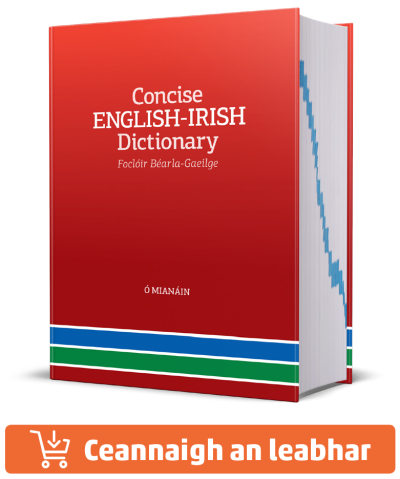Foclóir Gaeilge–Béarla
Ó Dónaill, 1977
An Foclóir Beag
Ó Dónaill & Ua Maoileoin, 1991
English–Irish Dictionary
de Bhaldraithe, 1959
Gramadach
Foghraíocht
tragacanth
tragedian
tragedienne
tragedy
tragic
tragi-comedy
tragi-comic
trail
trailer
trailing
trail-net
train
train-bearer
trained
trainee
trainer
training
training-college
training-ship
train-oil
trait
traitor
CUARDACH DROIM AR AIS
IN ENGLISH—IRISH DICTIONARY
ABAIRTÍ
IN ENGLISH—IRISH DICTIONARY
They are as common as blackberries, tá siad chomh tiubh le gaineamh na trá.
To be utterly destitute, bheith ar an trá fholamh.
The tide is down, tá an taoide tráite.
Writer who has drained himself dry, scríbhneoir atá spíonta, tráite.
The ebb and flow, tuile agus trá; teacht agus imeacht na taoide.
To ebb and flow, tuile agus trá.
The tide is ebbing, tá an taoide ag trá.
Ebb and flood, tuile agus trá.
House on the front, teach ar bhéal, ar aghaidh, na trá.
To gain the further shore, an trá thall a bhaint amach.
Nau: (Of ship) High and dry, ar an trá thirim.
F: To leave s.o. high and dry, duine a fhágáil ar an trá fholamh.
Low tide, low water, lag m trá.
(Of ship) To be neaped, bheith ar an trá fholamh.
Never-failing source, foinse gan trá, nach dtéann i ndísc.
F: His courage is oozing away, tá a mhisneach ag trá.
The tide is out, tá sé ina thrá.
Outgoing tide, an taoide trá.
Receding tide, taoide f trá.
To be on the rocks, bheith ar an trá fholamh.
To stop the rot, cosc a chur le trá an mhisnigh.
The tide is running out, tá sé ag trá.
Safe beach, trá gan chontúirt.
As numerous as the sand(s) on the sea-shore, chomh fairsing le gaineamh na trá.
Sands, trá ghainimh.
Seaside resort, baile m saoire cois trá.
F: Without a shot in the locker, gan talamh ná trá.
To be stranded, bheith ar an trá fholamh.
The flood is subsiding, tá an tuile ag trá.
Pol: The swing of the pendulum, tuile agus trá na bpáirtithe.
Low-tide, lag m trá.
To tide (it) into port, out of port, teacht i gcuan le sruth líonta, dul amach le sruth trá.
Prov: You cannot be in two places at the same time, ní féidir an dá thrá a fhreastal.
Low water, lag m trá, íochtar m láin.
To go by way of the strand, the wood, dul bealach na trá, na coille.
